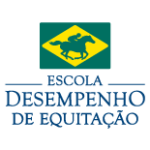- Início
- Escola Desempenho
- Bjarke Rink – ing
iHoca
Bjarke Rink
Known and respected in Brazil and abroad, Bjarke Rink was a rider, equestrian, writer, researcher and scholar of the history of riding. He founded the Desempenho Riding School and iHOCA – Homo-Caballus Institute.
Copenhagen, Denmark, 1940 - Cachoeiras de Macacu, RJ-Brazil, 2018

Bjarke was born in Denmark, but moved with his family to Brazil at the age of six. From an early age he was fascinated by horses, adventure and nature. At the age of 10 he got his first horse and learned to ride at the Clube Hípico Fluminense in Niterói, where he lived. As an adult, he continued with his horses and, at the same time, had a successful career in marketing and advertising.

In 1979, he and his wife Mara realized their dream, buying a beautiful farm together in Cachoeiras de Macacu, where they took their horses. They started planting bananas, raising dairy cattle and, from 1984, horses of the Brazilian Mangalarga Marchador breed.
In 1990, they founded the Desempenho Riding School to initiate children and teenagers into the equestrian life.
From 1992, Bjarke decided to work full-time with his lifelong passion: horses. Breeding, observing and training horses, he immersed himself in the study of the human-horse relationship throughout history. He has worked with scientists to uncover how the human-equine nervous systems connect during riding. In his historical investigations, he researched how the man-horse union accelerated history and transformed the world. He went on to give lectures and publish his theses and findings in specialized journals. He was a contributor to Horse magazine in Brazil and Equus magazine in the USA.
His first book, The Centaur Legacy (2004), was published in England by Long Rider’s Guild Press. The Portuguese version, Desvendando o Enigma do Centauro, was published by Equus Brasil (2008). In 2013, he published The Rise of the Centaurs in English, the first in a series of four fiction books about Equestrian Heritage. In them, you (the reader) ride with Bjarke (the author) through time, experiencing exciting key moments in history.

At the Desempenho Riding School, Bjarke started several courses and clinics for adults in 2000, most notably the course Unraveling the Enigma of the Centaur.
In 2006, he brought mounted archery to Brazil after learning about the sport in Hungary during a research trip into equestrian culture.
In 2010, he founded IHOCA – Instituto Homo-Caballus, dedicated to equestrian and environmental studies.
IHOCA went on to run the Performance Riding School, developing riding and management methods and techniques consistent with the philosophy of human-horse symbiosis. The methodology proposed by Bjarke and practiced with his students demonstrates that, in the practice of riding, the strength and speed of the horse interacting with the intelligence and strategic vision of the rider form a new entity – the centaur. The psychomotor unit thus formed works because it allows the command to be accepted and consented to by the “stronger” (the horse) if the “weaker” (the rider) does it with technique, but without violence or aggression. The rider will no longer be an instrument of domination, but a central system of direction and charismatic leadership. This learning allows us to EXTRAPOLATE beyond sporting activities, creating new paradigms in human relations, with animals and with nature.

Bjarke’s legacy and philosophy live on in the spacious grounds of the Desempenho farm, where the horses live in freedom and the Mata Atlântica is recovering. His teachings live on in his books and in the work of his disciples. The Bjarke Rink Garden is the starting point for an immersion in nature and in the Bjarke Rink Space, masters and students come together for meetings, workshops and lectures. He also left IHOCA a rich library, an amazing collection of equestrian stamps from all over the world and a mini-museum of equestrian artifacts from various eras and cultures.
Modalities,
Classes and Clinics
Contact
- Estrada Antônio José, km 5, Faraó, Cachoeiras de Macacu - RJ
- +55 (21) 98156-0212 (Tim) +55 (21) 99765-8576
- escola@desempenho.esp.br
Escola Desempenho de Equitação. All rights reserved.
Developed by Infinity Marketing
Desenvolvido por Trinta&Seis Consultoria Digital. Faça seu site conosco hoje mesmo.
